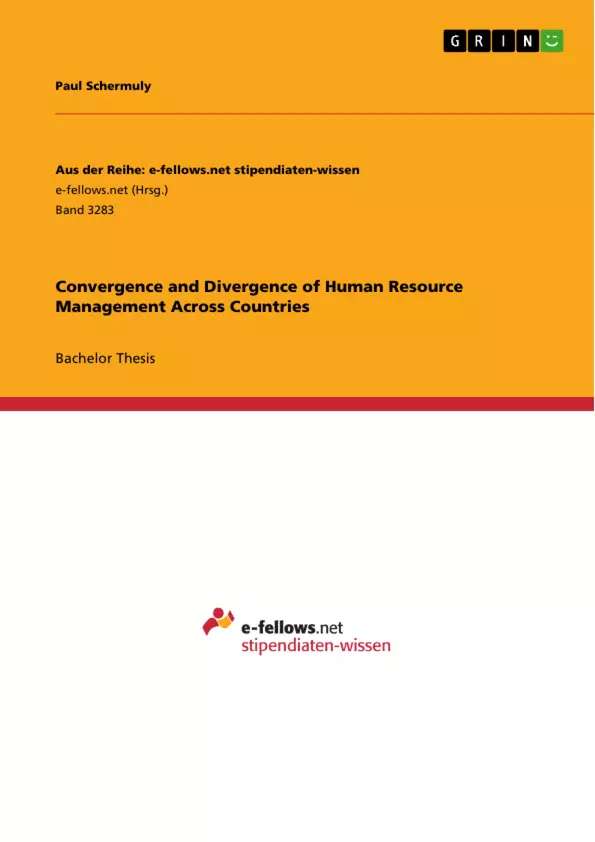Although cultural and contextual settings vary across the world, there is of course one level at which HRM is clearly universal: all companies have to manage and hence to utilize Human Resources. A few questions might arise when exploring the convergence-divergence issue in HRM.
How to define HRM and which particular HRM areas and practices should be analyzed for making hypotheses about the absence or presence of convergence? Which time horizon should one apply and how HRM convergence-divergence to be conceptualized? Can we find sufficient evidence for determining whether there are common trends of HRM becoming more similar or contrary more dissimilar over time and across nations? Are US derived HRM practices universally applicable to, for example, the European context? What are the specific HRM areas where researchers can identify developments towards convergence or divergence?
This bachelor thesis addresses the above mentioned questions in order to provide an overview about the most important issues in the convergence-divergence debate. The focus of this study is not to identify a winning side but instead to present some of the main concepts and best-available evidence for each perspective. Thus, this study aims at enhancing the readers understanding about relevant controversial subjects in the convergence-divergence discussion.
Inhaltsverzeichnis (Table of Contents)
- Introduction
- The Concept of HRM
- The Convergence - Divergence Debate
- Convergence: Universalist Paradigm
- Divergence: Contextual Paradigm
- Empirical Conceptualization of HRM Convergence-Divergence
- Type 1: Final Convergence
- Type 2: Directional Convergence
- Type 3: Stasis
- Type 4: Divergence
- Contextual Comparison between Europe and the USA
- Less Focus on Individualism
- The Role of State
- The Role of Trade Unions and Consultation
- The Role of Ownership Patterns
- Anaylsis of HRM Convergence in Europe
- HRM in Europe – One General Model vs. Distinctive National Models
- Evidence of HRM Convergence in Europe
- HRM Convergence-Divergence: A different perspective
- Discussion
Zielsetzung und Themenschwerpunkte (Objectives and Key Themes)
This bachelor thesis investigates the ongoing debate surrounding the convergence and divergence of Human Resource Management (HRM) practices across countries. The study aims to provide an overview of the main concepts and evidence for both perspectives, without taking sides, and enhance the reader's understanding of relevant controversial subjects within the convergence-divergence discussion.
- Defining the concept of HRM and its application in different cultural and institutional contexts.
- Examining theoretical viewpoints on convergence and divergence, including the Universalist and Contextual paradigms.
- Presenting a typology for conceptualizing HRM convergence-divergence across countries.
- Analyzing contextual differences between Europe and the USA, highlighting the role of factors such as individualism, state intervention, trade unions, and ownership patterns.
- Evaluating evidence of HRM convergence in Europe and exploring alternative perspectives that connect convergence and divergence with economic factors.
Zusammenfassung der Kapitel (Chapter Summaries)
The thesis begins by defining HRM and its relevant approaches, highlighting the importance of considering different cultural and institutional contexts when analyzing HRM practices. Chapter 3 delves into the theoretical debate surrounding convergence and divergence, presenting a typology for conceptualizing HRM convergence-divergence, encompassing final convergence, directional convergence, stasis, and divergence.
Chapter 4 conducts a comparative analysis of the US and European environments, outlining key contextual differences in individualism, the role of the state, trade unions, and ownership patterns. Chapter 5 examines the applicability of a general HRM model to the European situation, considering evidence of HRM convergence in Europe and introducing an alternative perspective that connects converging and diverging developments with economic factors.
The thesis concludes with a discussion of the findings from the selected empirical studies, highlighting their limitations and outlining a dual-level framework for understanding the impact of country-level and firm-level effects on HRM practices.
Schlüsselwörter (Keywords)
This study focuses on the central concepts of Human Resource Management (HRM), convergence and divergence of HRM practices, cultural and institutional contexts, Universalist and Contextual paradigms, theoretical and empirical evidence, European and US HRM, and economic factors influencing HRM convergence-divergence.
- Citar trabajo
- Paul Schermuly (Autor), 2017, Convergence and Divergence of Human Resource Management Across Countries, Múnich, GRIN Verlag, https://www.grin.com/document/503659



